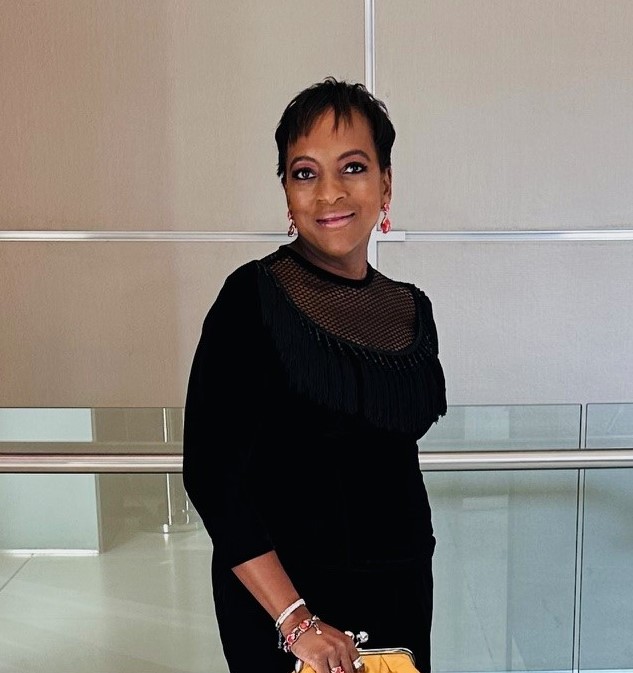Published on: 14 October 2024
As part of Black History Month (1 to 31 October), Derbyshire Healthcare NHS Foundation Trust is celebrating its diverse workforce by sharing colleagues’ stories and shining a spotlight on their lives. 
This year’s theme is ‘reclaiming narratives’ and marks a significant shift towards recognising and correcting the narratives of Black history and culture. Chinwe Obinwa, Consultant Psychiatrist at Derbyshire Healthcare NHS Foundation Trust, discusses what she does in her role, her Nigerian background, and the importance of celebrating Black culture and history.
What is your job role?
I am a Consultant Forensic Psychiatrist with a full-time clinical role. I have management responsibilities; I am the Clinical Director for the Forensic and Rehabilitation mental health division, which supports people in the community, in specialist healthcare facilities and in the criminal justice system. I am also the Medical Workforce Transformation Lead for the Trust.
Tell us something about your family and background?
According to the traditions of my family’s Igbo tribe in Nigeria, I am Adaobi; Ada means ‘the first daughter’ while Obi means ‘a King or the Home’. This is a position of great privilege and responsibility. Culturally, an Ada is considered a symbol of authority and a broker of peace in the family. This role has created a keen sense of responsibility in me which I have adopted.
Coming from a professional family, education was held in the highest regard. I enjoyed medical school and learning. I attended school in Nigeria in the 1990s with various organisations dealing with the impact of the HIV pandemic and was drawn to public health. I discovered Psychiatry during my service year, and I was also drawn to public services as a way to help patients regardless of their financial position. It is therefore not surprising that I was attracted to the NHS when I emigrated to the UK. The UK is very special to me as it is where I became a wife and mother to my three children and found my specialty within forensic psychiatry and more recently neuropsychiatry.
This year’s theme is about ‘reclaiming narratives’. Why is Black History Month important to you?
Transitioning to life in the UK is probably my greatest challenge in life. Nothing quite prepares you for enormity of the change you experience in every aspect of life once the excitement of the new adventure wanes.
Over the last 20 years, Black History Month has become increasingly poignant and a time of deep reflection for me. Sometimes it feels like I am reminded that I am black only in October; the struggles and difficulties faced by black people in the healthcare system, women in particular, are constantly brought to the fore. However, I am excited by the theme this year, ‘reclaiming the narrative’, as it allows for the celebration of the incredible professionals who work hard to keep up the healthcare system and for the greater awareness of the strengths of diversity.
During Black History Month, I find myself reflecting on one of the quotes of Maya Angelou, an American memoirist, poet and civil rights activist, who said: “Success is liking yourself, liking what you do and liking how you do it.’’ It means truly looking inside yourself and being honest about what you truly enjoy doing. As a psychiatrist, being part of Team Derbyshire Healthcare, engenders a sense of belonging and community. As a Trust, we seek to intentionally create a culture where success thrives. However, success is meaningful and enjoyable when it feels like your own, let us all work together to create an environment where success thrives.
How does your background shape the work you do for the NHS?
I consider myself lucky to be aware of senior female clinicians who not only break glass ceilings but continue to be positive role models for all. My greatest role model is my mother, who was a teacher and widowed in her 40s. She put all four of her children through university where they learnt resilience, self-belief and to always work hard – qualities I took into my work for the NHS.
What is your greatest achievement?
I believe my greatest achievement to date is an awareness of my self-worth, and coming into my own, as it has made me a better clinician and medical leader. I now am able to better advocate for my patients and promote the good work being done in my Trust.
Are you working on anything exciting currently in your job?
The current financial climate is difficult for the NHS, but it presents opportunities for innovation and challenges us to think outside the box about maintaining and building on the high-quality services we already provide. There are a lot of adjectives to describe a typical day for me but boring is not one of them! Developing new services, ensuring our services maintain their standards, supporting our local and regional services, training future doctors and consultants are some of the exciting things I am involved in.
I wish you all an enjoyable Black History Month!

